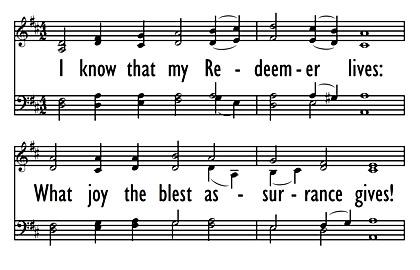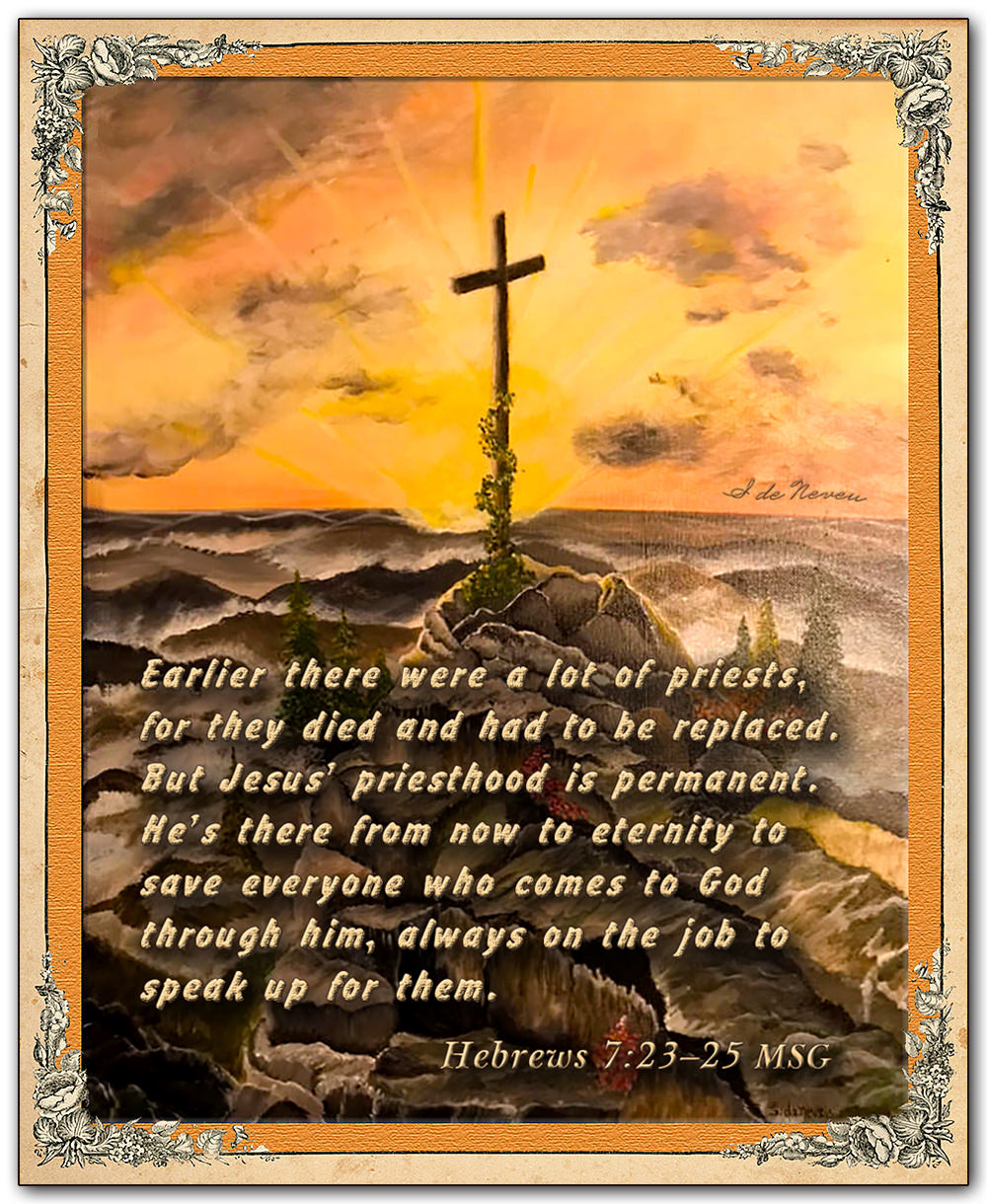Hebrews 7:23–28 . . .
“Christ’s Priesthood Is Superior!”
It was demonstrated in last week's commentary that Christ is the ultimate priest. God swore that Jesus would be "a priest forever" (v. 20) since he lives forever (v. 21). Today, we'll be shown that Lord Jesus is sinless and will always be there to intercede on our behalf (v. 25). He'll therefore be a far-superior mediator of our sinfulness than the sinful priests of the Levitical priesthood who served Israel in its tabernacle and temple (vv. 26–27).
We've been introduced to and assured of a new covenant of which Christ is the guarantor (v. 22). Father God not only spoke but swore on oath that his Son, Jesus, had become "a priest forever." God would never change his mind, as his oaths attest. This new-covenant priesthood of Jesus will never be changed or replaced. He's become our guarantor, surety, and security. His very much being a person while working as high priest provides such security. Christ Jesus is the guarantor, the perfect high priest who offered the perfect sacrifice of the new covenant. He'll do what the old covenant couldn't possibly do: He'll bring perfection (which will become apparent when we get to v. 28b below).
Jesus Has a Permanent Priesthood (7:23–25)
Earlier there were a lot of priests; all died and had to be replaced. We'll see in our opening verse that Jesus is a priest forever, fully representing an unchanging, permanent priesthood that provides believers with a lasting salvation.
23Now there have been many of those priests, since death prevented them from continuing in office; 24but because Jesus lives forever, he has a permanent priesthood. 25Therefore he is able to save forever those who come to God through him, because he always lives to intercede for them (7:23–25).
These three verses reveal how Old Testament priesthood was imperfect. The Law of Moses required numerous priests and high priests, since those men were mortal and couldn't serve as priests any longer than their natural lives. Sooner or later, death stopped them from serving, meaning their tasks would need to be passed on to the next in line. Jesus, on the other hand, possesses an "indestructible life" (7:16) — an eternal existence. Therefore, he can serve as a priest forever, which is exactly what God had promised, through the priestly order of Melchizedek (Psalm 110:4).
Note this important contrast: On one hand, under Mosaic Law, priests of the Levitical priesthood were numerous; their office constantly changed with replacements, depending on their character. The high priest and regular priests served until their death. Josephus, the first-century Jewish historian wrote that there were eighty-three high priests from Aaron's days to the temple's AD 70 destruction. Obviously, the Jews kept written records. There were also many other priests from Aaron's family who, while they didn't function as a high priest, carried out the priestly ministry. Provision had to be made for succession because, when a priest died, another priest took his place until he died, and so on.
On the other hand, "because Jesus lives forever, he has a permanent priesthood" (v. 24). Christ came to earth, suffered, died, and was raised from the dead and exalted to the presence of God's glory, seated at his Father's right hand, never to die again. Death has no power over him. Jesus is the one and only permanent high priest. Believers don’t need to worry that a "bad priest" will replace him. Instead, we can always approach God directly through our Lord Jesus.
The author compares in vv. 23–24 the permanence of the Melchizedek/Jesus priesthood with that of the Levitical priesthood. Because Jesus’ priesthood is permanent, he’ll be there from now to eternity, ready and able to save everyone who comes to God through him; he's always on the job, representing them. Having a permanent priesthood, Jesus has the power to save his people, again and again. All who draw near to Father God, through Jesus, receive from him the gift of eternal salvation. No such gift can be given to believers through the administration of a human, earthly priest (or church for that matter). Eternal salvation comes only through Jesus! Because he's our High Priest forever, he can and will continue to save us forever.
Verse 25 begins with the Greek word hothen, which literally means "therefore" so its following statement is entirely dependent on what's just been said. In prior verses, the author has been explaining how the Old Testament system of priests was limited and ultimately useless for our salvation. No human priest could offer sacrifice for all sins, since he couldn't live long enough to do so. Therefore, Christ can "save forever" believers in ways the Old Covenant was unable to do.
John Calvin wrote this about v. 25a and 25b: "'Therefore he is able to save forever' is the fruit of an eternal priesthood, even our salvation, if indeed we gather this fruit by faith as we ought to do. For where death or a change is, you will there seek salvation in vain; hence they who cleave to the ancient priesthood, can never attain salvation. And when he says, 'those who come to God through him,' or who approach God, by this phrase he points out the faithful who alone enjoy the salvation procured by Christ."
Since Christ Jesus lives always, he holds a permanent priesthood and is, therefore, "able to save forever those who come to God through him, because he always lives to intercede for them" (v. 25). The unchanging nature of Jesus’ priesthood means that the salvation he gives is also unchanging, permanent, and secure. This is foundational to our security as believers. And Jesus guarantees it! That's why 𝄞 "I Know That My Redeemer Lives . . . what comfort this sweet sentence gives!"
The New-Covenant’s Perfect Priesthood (vv. 26–28)
The overall point of today's passage is found in v. 26: that Jesus is the perfect, complete fulfillment of God's promised role of high priest.
26Such a high priest truly meets our need — one who is holy, blameless, pure, set apart from sinners, exalted above the heavens. 27Unlike the other high priests, he does not need to offer sacrifices day after day, first for his own sins, and then for the sins of the people. He sacrificed for their sins once for all when he offered himself. 28For the law appoints as high priests men in all their weakness; but the oath, which came after the law, appointed the Son, who has been made perfect forever (7:26–28).
So, we now have a high priest who fits our needs perfectly: completely holy, not compromised by sin, with an authority extending as high as God’s presence in heaven itself. Unlike all other high priests, Jesus, our Great High Priest, doesn’t need to offer sacrifices daily for his own sins, before he gets around to sacrificing for us and our sins. He’s done it once, for all: he's offered up himself as the one-and-only sacrifice; "once for all" means no repetition (see Romans 6:9–10). The Law appointed men to be high priests who were never able to get their job done right. But, as a result of Father God's intervening command, which came later, he appointed his Son who is absolutely, eternally perfect, to become the Great High Priest.
The attributes listed of Christ (in v. 26) correspond to those assigned to Jesus elsewhere in "Hebrews" and in the New and Old Testaments. Jesus is: "holy," meaning "righteous" (Luke 1:35; John 6:69); "blameless" and "pure," unstained by sin (Leviticus 21:17; 22:9; 2 Corinthians 5:21); "set apart from sinners," in the sense that he was tempted without falling into sin (Heb. 4:15); and "exalted above the heavens" by God (Philippians 2:9). Therefore, Christ is a sufficiently competent high priest.
One fundamental theme of "Hebrews" focuses on our confidence in Jesus Christ. We're to argue that Jesus holds a superior priesthood so that other believers will be encouraged to be strong and not fade while struggling with the agony of persecution. Instead of falling away (or returning to the imperfect system of Judaism the way this letter's Jewish-Christian audience had begun to do), everyone should be willing to "hold firmly to our confidence" in the gospel (Heb. 1:3; 3:6).
The point in v. 27 is clear: Jesus doesn't need to do what human priests did and do today, that is to offer sacrifice for their own sins, thereafter sacrifice for people's sins. Jesus doesn't offer sacrifices for his own sins because he has never sinned. (2 Cor. 5:21; Heb. 4:15). We ought to see and feel the once-for-all, eternal, perfect nature of Jesus' sacrifice, which unveils the true fulfillment of God's plan of salvation. Where human efforts will fall short (Heb. 7:18–19; Rom. 3:20) and animal sacrifices are inadequate (Heb. 9:11–14), Jesus' death on Calvary's cross fully enables him to save us from our sins (7:25). His once-for-all-time self-sacrifice for humanity’s sins provides valuable redemptive results (v. 27).
The term "once for all" deserves a lot more attention. The Greek ephapaxis is a great word for this expressed reality. John Piper wrote this about it: "The effect of ephapaxis makes Jesus the center of history. Every work of God’s grace in history, before the sacrifice of Christ, looked forward to the death of Christ for its foundation. And every work of God’s grace, since the sacrifice of Christ, looks back to the death of Christ for its foundation. Christ is the center of the history of grace. There is no grace without him. Grace was planned from all eternity, but not without Jesus Christ at the center, and his death as the foundation. Paul says in 2 Timothy 1:9 that God’s grace 'was given us in Christ Jesus before the beginning of time.'"
Note what Charles Spurgeon (English Baptist preacher, 1834–1892) said of Jesus' once-for-all sacrifice: "Our High Priest is of such dignity that none can be compared with Him. He is the Son of the Highest, the equal of the Father. I want you to think of this truth, because it may help you to see how great must have been the merit of the sacrifice when it was God Himself who 'offered up himself.' He was no mere delegated or elected priest, but Christ Jesus Himself, in whom 'dwells all the fullness of the Godhead bodily' (Colossians 2:9) — Christ, who is the brightness of His Father’s glory, and the express image of His person. He it was who stood at the altar, presenting 'himself' to God as the one and only sacrifice for sin."
The phrase "For the law appoints as high priests men in all their weakness" tells us that, under Mosaic Law, the priests were always men flawed with weaknesses, certainly sinfulness. They'd stand before God, offering their own sacrifices before they'd represent other sinners and sacrifice for them. But Jesus, "the Son, who has been made perfect forever," was and is completely sinless. Because he's a perfect High Priest, he's fully able — like no one else — to offer himself as a perfect sacrifice for our sin. Jesus is perfectly qualified to be our perfect High Priest.
Closing Considerations
The author has documented the weakness of the Aaronic priesthood and Mosaic Law, neither of which were capable of perfecting us by drawing us near to God and developing an intimate relationship with him. Instead, they placed barriers between sinners and God, restricting their access to him. The high priest was also restricted from accessing God; every high priest was permitted to enter the holy of holies, on behalf of his people, only once a year. This wasn't anything like the intimate relationship we can now have with God through the Lord Jesus, day after day, moment by moment. [Note: In this letter, the author has repeated the word "confidence" five times (in the NIV), as shown on this list.]
The old-covenant Aaronic priesthood couldn't perfect people by prohibiting them from drawing near to God in an intimate fellowship with him. Neither could it deliver them from sin; it only exposed their sinfulness! The new-covenant order of priesthood, however, is able to perfect men and women who can experience the forgiveness of sin while also drawing near to God through Christ’s priestly work, at any time, without fear or hesitation. This new-covenant priesthood has only one priest, the Lord Jesus Christ who lives forever. He atoned for our sins on the cross and continually intercedes on our behalf with Father God.
This is an encouraging disparity from the old order of Aaronic priests. Throughout Israel’s ancient history, there were numerous high priests of record because, after they died, all were replaced by a succeeding high priest. Thankfully, our Lord Jesus is, and will continue to be, our Great High Priest forever. Having such sworn permanency, he's able to save all who choose to draw near to him and abide in him forever, here on earth, as well as in heaven.
Because of Christ's ability to initially save us through his atoning death on Calvary's cross, he's fully able to assure us forever that he's able to save us forever. He's available to intercede with God for us. Sitting at God's right hand, Jesus is a tangible reminder that our sin debt is paid in full. Our salvation depends upon Christ, who lives forever to save and keep close to him everyone who draws near to God in faith.
Never forget this! High Priest Jesus lives forever on your behalf. There's never a moment when he isn't intentionally and purposefully interceding for your victory and success. The devil may try to suggest that you're all alone in your walk of faith; he may tempt you to be convinced that no one is aware of the difficulties you're facing. But rest assured that Jesus is aware of everything about you. In fact, he's making intercession for you right now.
And since Jesus has become your Great High Priest and lives to intercede for you, there's no need for you to struggle alone. He now sits at Father God's right hand, waiting for you to come boldly to him for help and assistance. There's no mountain he cannot move! So go to him today; make your requests to him now.
- Q. 1 How privileged are you to live under High Priest Jesus' new-covenant priesthood?
- Q. 2 In what ways is Jesus a better priest than those under the Jewish system?
- Q. 3 How does the Law relate to God's oath? . . . Why is the oath better?
Hebrews 7:23–28
New International Version (NIV) or view it in a different version by clicking here.
— listen to chapter 7, narrated by Max McLean.




